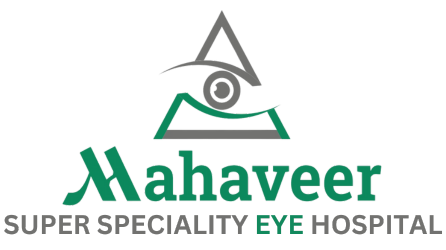At Mahaveer Eye Hospital, we believe that understanding the truth behind these myths is crucial for maintaining optimal eye health. Let’s address some common eye care myths and set the record straight with evidence-based facts.
1. Myth: Reading in Dim Light Damages Your Eyes
Many people believe that reading in low light can harm their eyes or worsen their vision. In reality, while dim lighting may cause eye strain and make it harder to see, it does not cause permanent damage to your eyes. Eye strain from poor lighting can lead to temporary discomfort, such as headaches or dry eyes, but it does not contribute to long-term vision problems. To reduce strain, ensure that your reading area is well-lit and consider using adjustable lighting to suit your needs.
2. Myth: You Only Need to Visit an Eye Doctor if You Have Problems
Regular eye exams are essential, even if you don’t experience noticeable vision problems. Many eye conditions, such as glaucoma or macular degeneration, develop gradually and may not present symptoms until significant damage has occurred. Regular check-ups at Mahaveer Eye Hospital allow for early detection and treatment of these conditions, helping to preserve your vision and overall eye health.
3. Myth: Wearing Glasses Will Make Your Eyes Dependent on Them
A common misconception is that wearing glasses will weaken your eyes or make you reliant on them. Glasses correct refractive errors, providing clearer vision, but they do not change the natural progression of your eyesight. Wearing glasses or contact lenses as prescribed simply helps you see better. If you experience changes in your vision, it’s likely due to natural age-related changes or other underlying issues, not because of the glasses.
4. Myth: Eating Carrots Will Improve Your Vision
Carrots are often touted for their ability to enhance vision, primarily due to their high vitamin A content. While vitamin A is essential for maintaining good vision and eye health, eating carrots alone won’t improve your eyesight beyond its natural state. A balanced diet rich in various nutrients, including vitamins C and E, omega-3 fatty acids, and zinc, is crucial for overall eye health. Incorporating a variety of fruits and vegetables into your diet is more beneficial than focusing on a single food.
5. Myth: Staring at a Computer Screen Causes Permanent Damage
The myth that prolonged screen time will cause permanent eye damage is not supported by evidence. However, extended screen use can lead to digital eye strain, characterized by symptoms such as dry eyes, blurred vision, and headaches. To mitigate these effects, follow the 20-20-20 rule: every 20 minutes, look at something 20 feet away for at least 20 seconds. Ensure proper screen ergonomics and consider using artificial tears to keep your eyes moist.
6. Myth: Eye Exercises Can Improve Vision
While certain eye exercises may help reduce eye strain and improve focus, they cannot cure refractive errors such as nearsightedness, farsightedness, or astigmatism. Vision problems often require corrective lenses or surgery, depending on their severity. Eye exercises can be beneficial for managing specific issues, such as accommodative dysfunction, but they are not a substitute for professional eye care and treatment.
7. Myth: Only Older Adults Need to Worry About Eye Health
Eye health is important at every age. While age-related conditions like macular degeneration and cataracts become more common in older adults, children and young adults are also susceptible to various eye issues, including digital eye strain and refractive errors. Regular eye exams from a young age ensure that any potential problems are identified and managed early, contributing to lifelong eye health.
By debunking these common eye care myths, we hope to provide clearer, more accurate information to help you take better care of your eyes. At Mahaveer Eye Hospital, our goal is to offer evidence-based care and guidance to ensure that your vision remains healthy and clear. If you have concerns about your eye health or need a comprehensive eye exam, don’t hesitate to contact us. Your vision is invaluable—let’s keep it in the best possible shape!
8. Myth: Contact Lenses Are Unsafe and Cause Eye Infections
Some people believe that wearing contact lenses is dangerous and leads to frequent infections. In reality, contact lenses are safe if used correctly and maintained with proper hygiene.
Fact: Following good contact lens hygiene—such as cleaning them properly, storing them in a sterile solution, and avoiding sleeping in them—can prevent infections and ensure safe use.
9. Myth: Rubbing Your Eyes Can Relieve Itchiness Safely
Many people rub their eyes when they feel irritation or itchiness, thinking it provides relief. However, rubbing your eyes can transfer bacteria, cause irritation, and even damage the cornea over time.
Fact: Instead of rubbing, try using a cold compress or artificial tears to soothe irritation and avoid potential infections or damage.
10. Myth: If You Can See Clearly, You Don’t Have Any Eye Problems
Just because you have clear vision doesn’t mean your eyes are completely healthy. Many serious eye conditions, such as glaucoma, develop silently without noticeable symptoms in the early stages.
Fact: Regular eye exams help detect hidden problems before they cause significant vision loss.
11. Myth: Children Don’t Need Eye Exams Until They Start School
Many parents believe that children only need an eye exam when they begin school. However, vision problems can develop much earlier, affecting learning and development.
Fact: The American Optometric Association recommends that children have their first comprehensive eye exam at six months, again at age three, and before they start school.
Conclusion
By debunking these common eye care myths, we hope to provide clearer, more accurate information to help you take better care of your eyes. At Mahaveer Eye Hospital, our goal is to offer evidence-based care and guidance to ensure that your vision remains healthy and clear.
If you have concerns about your eye health or need a comprehensive eye exam, don’t hesitate to contact us. Your vision is invaluable—let’s keep it in the best possible shape!



